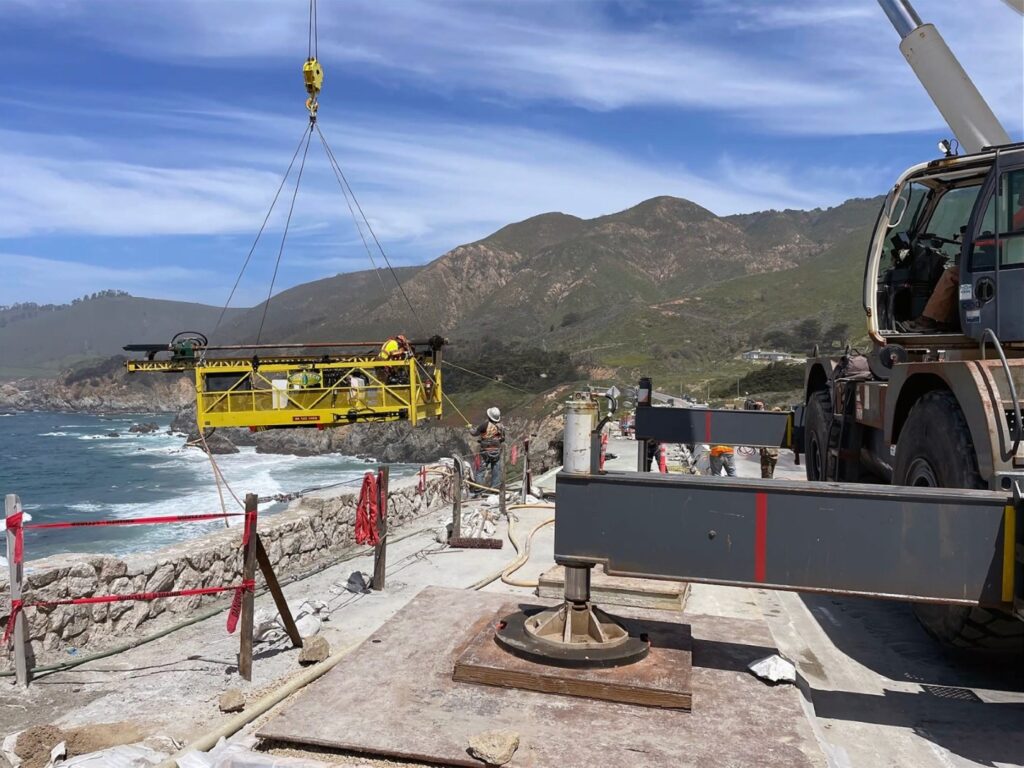
SALINAS – With its eye on a May 27 reopening of the roadway, Caltrans reports that it continues to advance on repairs to stabilize the edge of the roadway at the Rocky Creek slip-out which occurred nearly a month ago and has reduced access to Big Sur to locals and essential workers only.
“We’re definitely increasing our confidence, not only in the repair strategy, but hitting our stride in doing the work,” said Caltrans District 5 Emergency Manager Zeke Dellamas at the Wednesday Monterey County news briefing.
Daily convoys for locals and essential workers will continue as weather permits, but with the Big Sur International Marathon this weekend, the Sunday schedule will run earlier at 4 a.m., with a 4:45 a.m. hard closure to allow all vehicles to clear the course which will then see the highway closed from 5 a.m. – 1 p.m., for the marathon race.
Caltrans spokesman Kevin Drabinski said stabilization work on the edge of Highway 1 at the Rocky Creek slip-out includes dealing with the erosion point or head scarp.
“That edge stabilization work is really an attempt to stabilize the outside edge of the roadway so that the erosion beneath the roadway doesn’t happen,” said Drabinski.
Work continues with the installation of vertical and horizontal rock dowels, with some of the work being accomplished by workers suspended in a basket from a crane. Once the dowels are in place and secured with bolts, creating a mesh, concrete and shotcrete are blasted onto the work providing protection and strength to the slope.
Drabinski said the shotcrete permits water to drain so that it does not build up behind the work.
But Caltrans faces challenges from the weather and it is not always rain.
“We did have to stop work this last weekend, Saturday and Sunday, because of excessive winds,” he said. “We have a 25 mph wind limit. It looks like that wind limit may be exceeded later this week so we’re keeping an eye on that. We may have to … stand down on that particular basket work. That doesn’t mean that other work can’t continue on at the site. But that particular effort has to stand down once the wind gets up above 25 mph.”
Dellamas said Caltrans is working closely with the National Weather Service for its spot location forecasts looking not only at potential rain but wind which seems to be the more pressing factor.
“There is other work that can be done,” said Dellamas. “Over the weekend there was some additional drilling that went in that works like a reaction to the hanging drilling basket. They have to have something to bear against. That’s going quite well.”
Dellamas said that simultaneous to the edge stabilization work, is the installation of the temporary signal which will allow for the return of unrestricted traffic flowing to Big Sur or maybe as far down as Dolan Point where a slide repair job is ongoing.
“I’d just like to reiterate that we’re putting in the temporary signal,” said Dellamas. “The idea is that as soon as the repair is complete, we’ll turn the road into one-way reversing traffic with this temporary signal system.”
Dellamas said poles have been installed, conduit is already in place over ground and running across Rocky Creek bridge, and work continues with Pacific Gas and Electric Company for a power drop, controller cabinets and backup generator system.
Highway 1 problems in Big Sur
Progress made on three Big Sur Highway 1 landslides
Once Highway 1 stabilized at Rocky Creek, traffic can return to Big Sur
Crews escort cars around damaged section of Highway 1 near Big Sur after lane collapses in storm
Caltrans to reduce speed limits on Highway 1 through Big Sur Coast
Caltrans says Highway 1 to reopen at Paul’s Slide on Big Sur coast in late spring
“A lot of work is happening out there and I’d be remiss to not point out that we’re also moving forward with the full restoration of the highway, so it’s going to be a much longer process to get there but we call that a permanent restoration of two full lanes,” said Dellamas.
He said that to date Caltrans has completed the survey which allows its design teams to start developing the alignment, and a preliminary bridge site submittal.
“We’ve had onsite meetings with our geotechnical teams and we’re bringing in a geotechnical sub to do a subsurface investigation,” said Dellamas. “It’s really critical that we know what the conditions of the soil and the rock are where these future supports are going to go. Tomorrow is another important meeting with the structures design team out of Sacramento who will be leading the actual design effort of the structure.”
